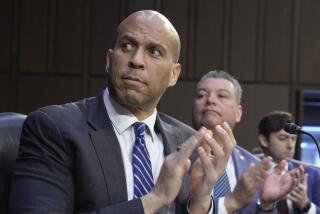AIRLINES : 2 Senators Unveil Bill to Spur Airline Competition
- Share via
WASHINGTON — Deregulation in the airline industry has led to domination of domestic air travel by a few companies, two Republican senators said Friday in introducing legislation they say would increase competition.
Sens. John C. Danforth (R-Mo.) and John McCain (R-Ariz.) said deregulation has failed to benefit the traveling public, despite an early flurry of competition, but that their bill is not a return to regulation.
The bill would instead “address what we consider the most egregious airline practices inhibiting competition,” McCain said.
“The traveling public is not going to be dangling from the strings of a few huge airlines,” Danforth said.
Under their proposed legislation:
- Airlines would be barred from owning computerized reservation systems, used by 85% of travel agents. The sponsors say the owners require agents to book a minimum number of the owners’ flights, the system updates the owners’ fare and seat availability more quickly and other airlines without the systems must pay booking fees to use the system.
- Slots, the landing rights at airports currently controlled by the major airlines, would be auctioned off, giving preference to new entrants in the industry.
- The Transportation Department would have a stronger say in assuring competition by monitoring activity in the industry using standards developed by the Justice Department for use in antitrust enforcement.
- The Transportation Department would allow airports to levy per-passenger user fees earmarked for expanding airport capacity, improving security or reducing the impact of airport noise.
- The Federal Trade Commission would be given authority to police the industry for unfair practices. Some of the practices would be predatory pricing; overcharging for subleases of terminal space, gates and baggage carousels, and use of majority-in-interest clauses in airport leases to restrict expansion.
- Airlines would be forbidden to share booking codes--the initials for airlines. For instance, a flight from Columbia, Mo., to London might have a TWA code even though “feeder” lines aren’t TWA owned. Each airline would have a unique code, Danforth said, which would facilitate competition for bookings among regional carriers.
McCain said the market share of the nation’s top nine airlines grew to 94% in 1986 from 78% in 1985.
More to Read
Inside the business of entertainment
The Wide Shot brings you news, analysis and insights on everything from streaming wars to production — and what it all means for the future.
You may occasionally receive promotional content from the Los Angeles Times.










